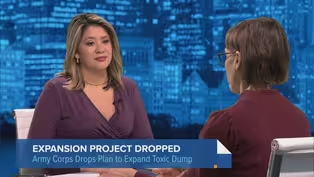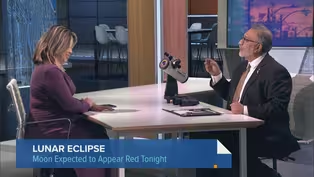Chicago Tonight: Latino Voices
Medical Schools Are Enrolling Fewer Black, Latino Students
Clip: 3/13/2025 | 10m 26sVideo has Closed Captions
Diversity is in decline since the U.S. Supreme Court struck down affirmative action in 2023.
Since the U.S. Supreme Court struck down affirmative action in 2023, diversity is in decline at medical schools nationwide. This includes a 10.8% drop in medical students of Hispanic, Latino or Spanish origin.
Problems playing video? | Closed Captioning Feedback
Problems playing video? | Closed Captioning Feedback
Chicago Tonight: Latino Voices is a local public television program presented by WTTW
Chicago Tonight: Latino Voices
Medical Schools Are Enrolling Fewer Black, Latino Students
Clip: 3/13/2025 | 10m 26sVideo has Closed Captions
Since the U.S. Supreme Court struck down affirmative action in 2023, diversity is in decline at medical schools nationwide. This includes a 10.8% drop in medical students of Hispanic, Latino or Spanish origin.
Problems playing video? | Closed Captioning Feedback
How to Watch Chicago Tonight: Latino Voices
Chicago Tonight: Latino Voices is available to stream on pbs.org and the free PBS App, available on iPhone, Apple TV, Android TV, Android smartphones, Amazon Fire TV, Amazon Fire Tablet, Roku, Samsung Smart TV, and Vizio.
Providing Support for PBS.org
Learn Moreabout PBS online sponsorshipCourt struck down affirmative action 2 years ago.
Diversity is in decline at medical schools nationwide.
This includes a more than 10% drop in enrollment for black and Latino students.
Despite an increase in applicants.
Joining us now with more on the potential impact on patients are doctors, Susie Lopez, a primary care physician and assistant dean of diversity, equity and inclusion at Rush University Medical Center.
She's also the court adviser of the Latino Medical Student Association and Dr. Monica move to full primary care physician and assistant dean of diversity, equity and Inclusion.
Loyola University, Chicago School of Medicine.
She's also associate professor of medicine.
Thank you both for joining us.
Dr Maloof.
I want to start with you.
When you read about the decline in medical students from different cultural backgrounds such as left the nose, what goes through your mind is also a woman of color.
>> You know, I think overall the decline is really harmful for our patients, our communities that we live in as well as for the medical societies.
We know that from really good data that having differs physicians and nurses helps improve patient outcomes helps patients meet their health care.
It cools and live longer, but also helps the physician workforce.
I'm physicians who work in diverse environments tend to do better, have better job satisfaction and care for our able to care for diverse communities.
Better.
So is the climb is really concerning for the medical landscape as a whole across the board.
>> And Doctor Lopez just share some obstacles, students of color face when deciding to enter the medical field.
>> No I want past the Bulls compared mines.
That maim young song.
We 5, 9 make you sign center.
being friends to families to Senate.
going Yeah.
I heard somebody talking act then transplant.
It's part of it is new students who are carrying very motivated students thinking that meantime, Central student do then us?
the thing that's a on and landslides and will and signed when might have test new.
That's nearly something is not accident.
Not that I need to us.
That's understandable.
And Dr. Maloof lies in incorporating diversity and health equity in resident education.
>> So important.
>> You know, I always like to say that we tried to get to health equity by accident and incident what I mean by that is that for many decades and U.S. site at medical schools, we hope that that position treat all patients the same in all patients with dude, great, no matter where they came from or what the color of their skin was.
But over the last several decades, lies that that's cause a lot of divert disparities.
So black and Latino patients and Hispanic patients are more likely to die from chronic diseases like diabetes and heart disease and higher rate than white patients.
So in order to help mitigate and bridge that gap, we really need to be educating our positions and our residents to be the best they possibly can be taking care of all patients regardless of where they come from and recognizing that these disparities exist so they could work towards mitigating mom.
>> Dr Lopez.
You know this next question is what are the benefits for patients to have physicians who are from their own race and Ignas City?
You know, I remember growing up, you know, going to the clinic at that time.
You're spending all day at the clinic my mom to have insurance at that time.
And I remember having to translate because the doctor only spoke English.
You know, how important is it?
>> It's not which expect action altar.
Sorry.
It didn't get speak.
Cheryl standing next action at the culture of understanding the culture there's a based around and find it.
he understand missed frankly, And do is when reach a different.
But I'm taking and we tend to do in the area medicine where we sent us a lot just get on And I came to incident, was that an acting just honestly, I'm just wondering, is months, rather than learned fire and and snow It's not the the highest health, something should for think is it's the exact What are your thoughts?
aloof.
>> Yeah, I mean, echo everything.
Dr Lopez said that it's so impactful for patients to have a position that speaks their language, understands our culture and that doesn't just have to be that you're from the same culture.
But just coming in with an understanding and openness.
And so that's what I was alluding to earlier about having diverse medical schools makes all the doctors better because they're all been trained to take care of interactive people from different backgrounds and understand that you need to adjust your recommendations based on cultural nuance, cultural differences and social differences so that diversity is so important for all of us as we train and grow together.
But then also for patients being able to connect with them.
>> And in that aspect, Dr Maloof.
What are your thoughts on the Trump administration's executive order to Target Dei programs?
And how does would you say it's affects the future of health equity?
>> Such a great question.
It's been a really challenging time for all of us in the diversity space.
I will say that as a dean of dei.
Welcome criticism.
If you have thoughtful really evidence-based ways to help us improve.
I welcome that because what we're doing is innovative the new emboldened.
We need that feedback to be able to get better.
But what's happening is not that what's happening is and discriminatory attacks that are really persecute.
Tory.
And there is also that is that all these benefits that we talked about, health equity diversifying.
The physician workforce, our friend.
And that's going threaten the health of all Americans, not just those of color.
>> Same question for you, Dr Lopez.
What do you know?
What are your thoughts when you see, you know, some of these programs and at jeopardy would what do you think that people are are not understanding of how essential these dei programs are?
Well, 100 went back in done that.
But I think thing it would provide, don't want to so it's >> It's not great.
they it.
gender assigned read right.
It's learning ensure that want to turn to Witz.
admit productive.
Don't have access Dixon line in from it on.
It's not just And what would you Just Dr Lopez, you know, what can you tell us a bit about your background and what type of discrimination you even have experience in healthcare?
>> Yeah, would here anybody who's been tempted to from Leeds and sometimes they can but is going you can raise your hand ask that you used.
think if says patient's condition them a raise their hands mice time once used for maybe says their activist.
And we live in is under physical therapist by kitchen area.
is that a woman and women of color 100 patients families don't stay might sign exemptions for environmental service.
are still Some Americans there that rain settlement thing you.
Probably mission to bring back to stop.
you're going this issue here.
We'll talk to you.
Same question for you.
Don't Have you ever had to experience, you know, these type of obstacles and challenges?
>> I think that I've been really blessed to have a really supportive training environment everywhere that I've been.
But those examples Dr Lopez gave are examples that I think echo across the medical spectrum for and women of color.
I've had many experiences that are just like that.
but I think that what I really focus on is my students that we mentor and teach and how to help create a more inclusive environments.
They don't have to go through this.
Training can feel like they don't belong.
They don't belong in that way code.
They don't belong as the in the hospital in this medical school and having so many experiences like that that have become normalized that can sometimes feel like that for those students that can have its called Imposter syndrome feeling like they don't belong because they walk into the hospital and someone thinks they're there to clean the floors.
And so a lot of her work in the office of Diversity here is to help and make sure that the medical school in our hospital is really safe and inclusive for everybody who walks through these doors.
Patients and students alike.
What advice?
You know, the ending question is what advice would you give?
>> To someone who is interested in going into the medical field, you know, and and is a little bit nervous.
>> I can start by saying that I being a doctor is the best job in the world.
I have days that are terrible and I'm and and come home gas and break out.
But I wouldn't trade for the world.
I think be able to make an impact in my patients.
Lives be able to connect them with the care they need is something that is me so much fulfillment even when I'm exhausted and so burnt out.
And I really want encourage anybody thinking about going into medicine, too.
And if you have that energy a passion for helping people taking care of your community, then listen to that.
pursue, pursue a career in Healthcare, Inc.
It's a very rewarding career.
>> Well, thank you both for
Army Corps Drops Plan to Expand Toxic Dump on Lake Michigan
Video has Closed Captions
Clip: 3/13/2025 | 2m 40s | The move comes following a yearslong battle with community groups and environmentalists. (2m 40s)
Chicago Astronomer Joe Guzman on Tonight's Lunar Eclipse
Video has Closed Captions
Clip: 3/13/2025 | 7m | Don't go to bed too early tonight, Chicago. (7m)
Providing Support for PBS.org
Learn Moreabout PBS online sponsorship
- News and Public Affairs

Top journalists deliver compelling original analysis of the hour's headlines.

- News and Public Affairs

FRONTLINE is investigative journalism that questions, explains and changes our world.












Support for PBS provided by:
Chicago Tonight: Latino Voices is a local public television program presented by WTTW

